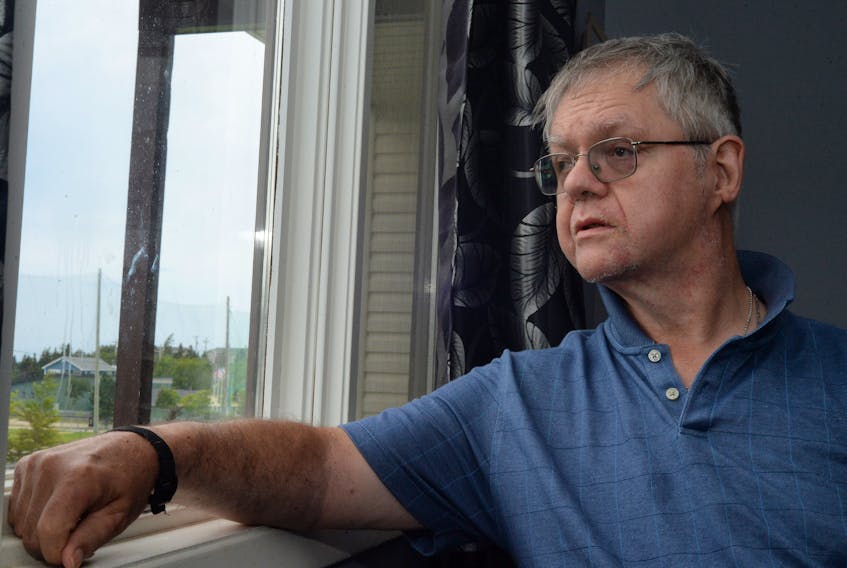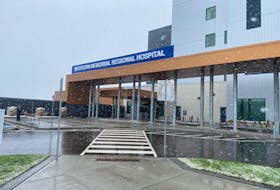As Bill Westcott shares a photograph of his late brother John, it’s hard not to do a double take.
Although 18 months apart in age, they looked very much alike. And they were close — the brothers shared not only a fraternal bond, but one of experience, as they were both born with cerebral palsy.
And since 1991, they had shared a house that Bill, a now-retired federal civil servant, had specially built. Both used power chairs, but they lived independent of help — John did the cooking and cleaning.
It was a good life until John died in July 2017 at age 60.

Bill is still grieving, and looking for answers about how John’s bowel cancer diagnosis came so terribly too late.
“He is in a much better place now. He has no pain. He is with the Lord,” Bill said in an interview in his St. John’s home.
“I miss him terribly and it’s these kind of (health-care) decisions … they made or didn’t make that impacted me and impacts everybody in a similar situation.
“Speaking out isn’t going to bring my brother back.”
Bill wrote a letter to Eastern Health this year detailing his concerns about how John’s case was handled.
Though he’d made trips to emergency — initially St. Clare’s and the last one to the Health Sciences Centre — for several months, John wasn’t given a diagnostic test until three weeks before he died.
That CT scan confirmed he had bowel cancer and there wasn’t anything treatment could do for him.
From December 2016 on, John made three trips to emergency. By July 25, 2017, he was dead.
Bill, who accompanied his brother to emergency, said there were several clues that John was gravely ill.
A scan through his medical records sees him being treated by different doctors for vertigo and severe dizzy spells, severe nausea, difficulty with co-ordination and some vision problems. He was also dropping weight.
Eastern Health’s emergency department manager wrote to Bill in late July, offering condolences and an apology that St. Clare’s emergency did not “meet your expectations with the care we provided.”
Bill had also expressed some concerns about some staff being rude and judging patients with disabilities, or those who appear unkempt.
But as for Bill’s concerns about the delay in John getting diagnostic testing, the emergency manager referenced “Choosing Wisely NL,” a program that encourages physicians to look critically at how and when they request interventions such as diagnostic testing.
“While I cannot speak on the decisions made by your community physician, I can speak on behalf of the emergency program and confirm that the service we offer is episodic, with a focus on the presenting complaint,” the letter from Eastern Health said.
“Holistic, ongoing care is certainly best handled by a primary care provider, and not emergency room staff who are trained to focus on the immediate cause of a presenting illness. I am sure that you can appreciate if we had to investigate ongoing concerns our wait times would be even longer.”
That’s no comfort for Bill, who doesn’t think moving people through the line faster is the point.
In a statement, Eastern Health, said it can’t discuss the case publicly due to privacy laws.
Eastern Health, as the letter to Westcott stated, noted emergency rooms typically provide care and treatment to individuals presenting with acute or sudden-onset of symptoms and conditions, or traumatic injuries.
“The focus of an emergency room visit is around the presenting complaint at that time,” Eastern Health said. “Health concerns outside of urgent issues are best dealt with by a patient’s primary health-care provider/family doctor who has a more thorough knowledge of the individual and their previous health issues and concerns.”
For primary medical care, for years John went to a family clinic operated by Memorial University at the Miller Centre, where he would see whatever doctor was available, his brother said. It was accessible for him to get in and out with his power chair.
Bill said at one point a family doctor wrote a letter for the internal medicine specialist on duty in emergency in hopes John would be admitted to hospital, but he was again sent home.
“You didn’t need a medical degree to know the man wasn’t well,” Bill said.
“I spoke for him. I said, ‘He has been losing weight, he’s in a lot of pain. Is there anything serious like cancer you are seeing?’ They said ‘No.’ and they were still not testing at that point in time.”
Bill said his complaint to Eastern Health wasn’t meant to be a witch hunt.
“My purpose in doing this is to advise people generally what happened to him. And I am sure we are not the only ones,” he told The Telegram.
“It might help someone down the road. They might be a bit more insistent. (John) came back (to emergency) three times and in each case he presented in a worse kind of situation.”
In 1991, John wasn’t living in suitable housing conditions for his disability. The intent at the time was for their mother to move into the new house, but she was buried the same day the foundation was being poured.
“She said, ‘I am not worried about you because you’re going to be alright. I am worried about him.’” Bill recalled.
But when Bill assured her that John would have a place in his new house, she was at peace.
“He was a fine source of advice and guidance,” Bill said of his brother. “He used to call himself my wingman. In fact he was. … We were always together.
“He only really started to get out when he came out here when I built the house. We used to go out for groceries, go to Walmart, hockey games. Now I am doing it on my own. I fully believe he is with me. He just can’t hear me.”
The brothers, said Bill, chose not to ask for home care or help and wanted to go it on their own.
“We have been very fortunate compared to some other individuals with disabilities,” Bill said.
John had various medical conditions — including diabetic ulcers. As he grew increasingly ill last year, attention focused on his pressure sores — a problem he had been dealing with back and forth to another service at the Miller Centre since 2015 as alterations to his power chair dragged on. He was advised to go into a nursing home to help get them dealt with and was placed at Glenbrook Lodge, and the pressure sores seemed to be improving.
Various specialist appointments were suggested to deal with the other issues like vertigo and vision trouble. A colonoscopy appointment was scheduled for November 2017, but when it was eventually moved up, it was too late.
One day, Bill got a call from Glenbrook that John wasn’t able to keep his food down and was being sent to hospital.
That’s when got the diagnostic test.
“It was too late — this was six months after his first intervention with the hospital,” Bill said.
Bill said the letter from Eastern Health didn’t address his issues, and protocol needs to change.
“If it is due to money, we have got to find a way to provide enough money to do the right thing,” he said.
“If you look at the broader picture, there was something missed in primary care or something missed in emergency. Either way, he was wronged. I saw nothing there (in the medical records) he was offered any kind of test and he turned it down.
“I was initially angry. I was grieving. I am still grieving. There is not a day that goes by when I don’t shed a tear over my brother.”









